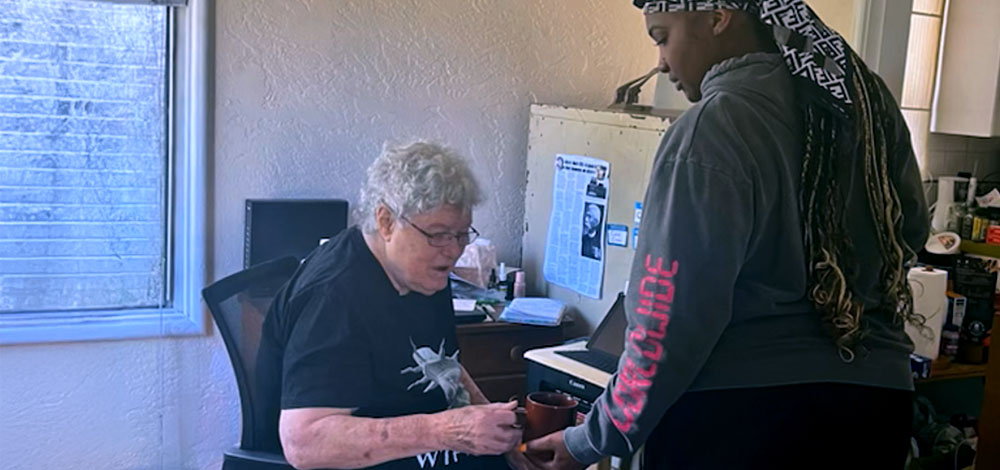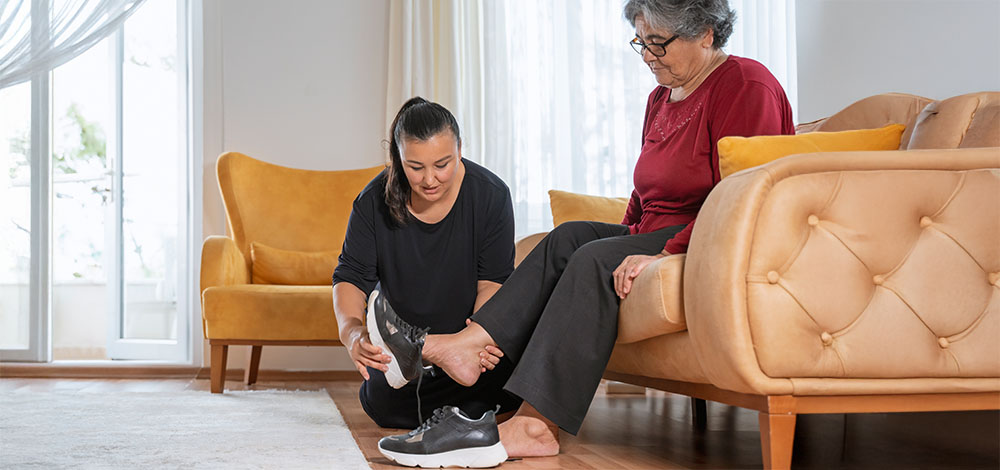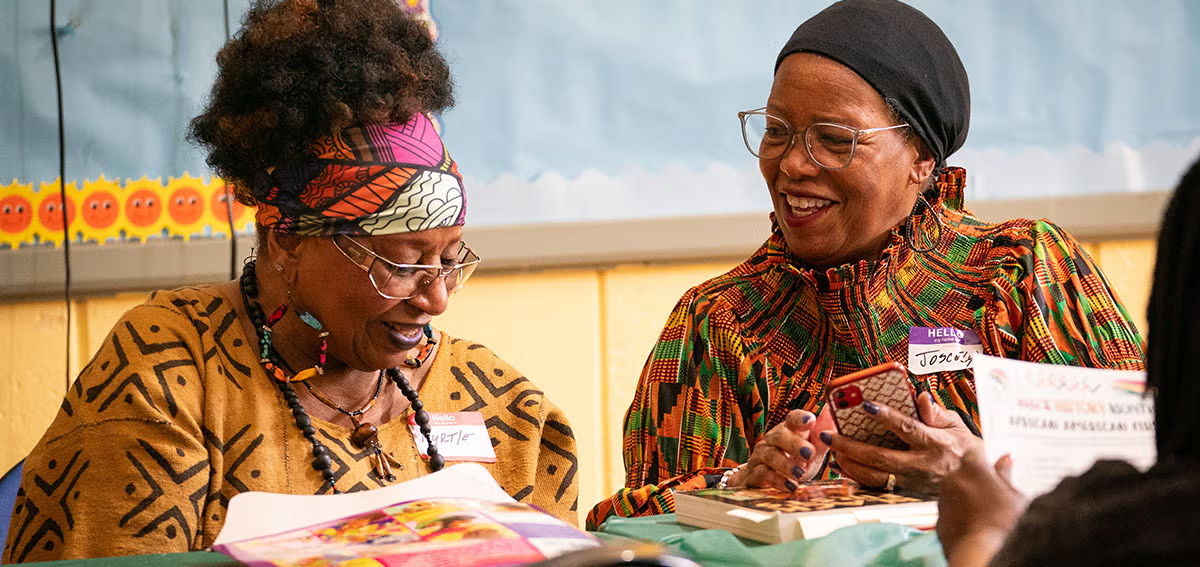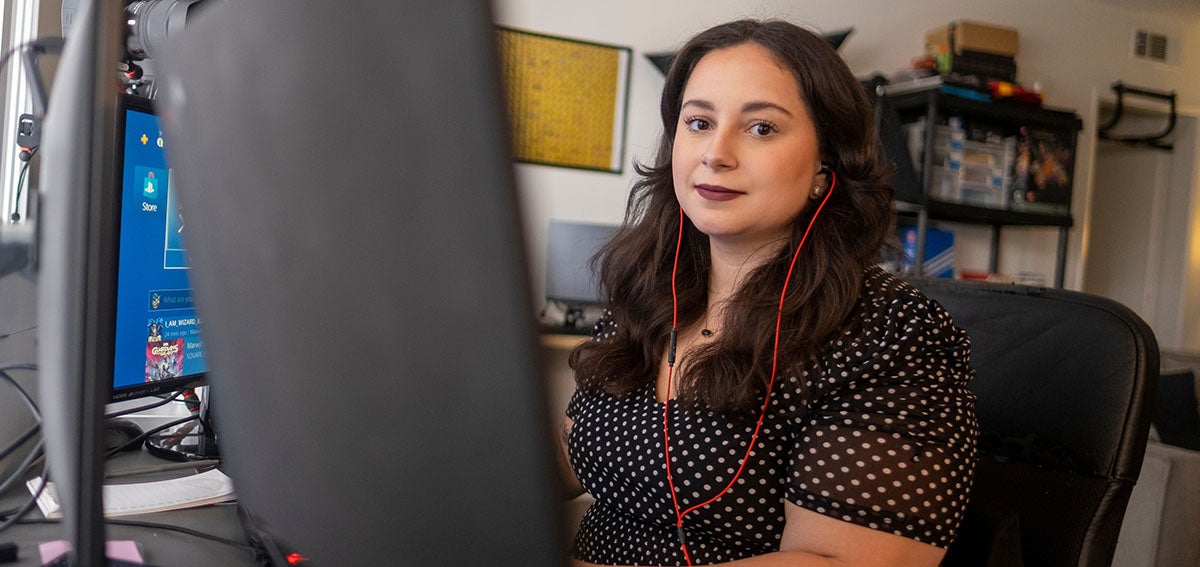
A year into the pandemic, 73-year-old Judith Davis felt confused and stressed as she deliberated over whether to get vaccinated against COVID-19. Flooded with conflicting information from media reports and relatives, she wasn’t sure whom to believe. And Davis had a history of severe allergic reactions to flu vaccines, Novocain, almonds, and other foods. After months of vacillating, Davis had an opportunity to share her concerns with someone she trusted.
Davis, who has lived for years with diabetes, incontinence, asthma, and muscle weakness from a stroke, received monthly phone calls from a care manager employed by the Partners in Care Foundation, a community-based organization providing health and social care services to Medi-Cal enrollees and others in Southern California.
“He checks in to see how I’m doing,” said Davis, a Medi-Cal enrollee in the Los Angeles suburb of Chatsworth. The care manager, Greg Chukuryan, arranged for her to receive meals and medical supplies. When Davis shared her hesitancy about the vaccine, he explained that she was at higher risk of hospitalization from COVID-19 due to her age and health conditions. “Greg asked me to think about it, and he offered to set up an appointment if I decided to get vaccinated,” said Davis.
After the conversation, she was ready. “I was nervous when I went in for the shot, but I only had an achy arm for a couple of days,” said Davis, who later received a second dose and a booster. “I felt more protected and better about being around other people because I didn’t want to infect them.”
Helping Medically Fragile Seniors
Davis’s willingness to get immunized was an encouraging sign to investigators exploring new strategies to reach vulnerable populations. Davis is part of a CHCF-funded study launched by two University of Southern California (USC) researchers who suspected that care managers might have more success than physicians at persuading medically fragile, home-based adults enrolled in Medi-Cal to get vaccinated. These adults are significantly less likely to be vaccinated than all Californians in the same age group, according to a recent report from the California Department of Health Care Services (DHCS). Data from the report showed that 72% of Medi-Cal beneficiaries 65 and older had received one dose of the vaccine by April 30, 2022, compared to 91% of all Californians in that age range.
“Doctors are so overburdened and do not have time to have conversations with patients who are hesitant to get immunized,” said Sonali Saluja, MD, one of the researchers and an assistant professor at the Keck School of Medicine at USC. “Patients are also less likely to trust physicians who are not from their community.”
Saluja and Sue Kim, PhD, MPH, an associate professor at Keck, recognized that there was little research investigating whether nonclinicians could promote healthy behaviors. When the researchers learned that care managers from Partners were calling or visiting elderly people with chronic illnesses, they realized the monthly interactions would be an ideal opportunity to talk about vaccination status. The care managers were also more likely to connect with clients because they more closely matched the demographics of the patient population than physicians. In the study, 42% of the care managers — who typically coordinate meals, transportation, medical appointments, and other services for clients — were Latino/x. Of the people who received long-term case management services from Partners in 2021, 39% were Latino/x, according to the foundation.
Learning Nonconfrontational Strategies
In the fall of 2021, Partners estimated that approximately 30% of its 600 clients were unvaccinated. To better understand the barriers to immunization, the researchers conducted surveys and discovered that more than two-thirds of the unvaccinated clients strongly believed that they had a medical reason to avoid the shots. And at least half strongly agreed with one or more of the following reasons for not getting immunized: I am worried about serious vaccine side effects or getting sick from the vaccine; I don’t trust the government to develop a vaccine; the COVID vaccines have not been tested long enough.
Although the care managers were ideal candidates to initiate vaccine conversations with vulnerable adults, some were nervous about having these discussions, said Natalie Monden, who oversees care managers as senior director of home-based and community alternatives at Partners. “They knew it was a sensitive topic,” she said.
To equip the care managers to engage patients, the researchers developed two 60-minute training sessions based on data from a client survey and focus groups with the care managers. The training included an overview of COVID-19 epidemiology and vaccination effects, evidence about COVID-19 vaccination barriers, and motivational interviewing techniques. “We taught them how to ask people questions that elicit their concerns and questions,” said Kim. Then care managers can ask if clients are interested in information relevant to their questions. For those who were concerned that the vaccines had been developed too quickly, for example, care managers could explain the approval process and the long history of studying the science behind the mechanisms used in the vaccines, Kim said.
When Sandra Bravo, a care manager for Partners in Bakersfield, started talking to clients about vaccine status, she discovered that the conversations were sometimes challenging. One woman in her 70s believed the government had created the vaccine too quickly and was using it to control the population. Bravo encouraged her to read about the benefits of getting vaccinated, and the woman said she would consider it. The client, who suffered from high blood pressure, high cholesterol, and sleep apnea, was later hospitalized with COVID-19. Once she recovered, the woman got vaccinated and boosted. Bravo talked with two other clients who did not change their minds about getting vaccinated until they contracted the illness. “Even though the conversations are difficult, I am still planting seeds,” Bravo said. “They ask questions, so I know they want to know more.”
Interest in Immunization
For Shawn Callahan, a Partners care manager in the San Fernando Valley, her good rapport with clients combined with the training facilitated numerous conversations about vaccine status with clients, most of whom were experiencing homelessness. She discovered that many were interested in immunization but did not have access to phones or computers to set up appointments at pharmacies and county sites. “It was a struggle to schedule the appointments for them because I needed detailed allergy information and health histories,” she said. “I would tell them to write down the confirmation codes on a piece of paper.”
Although most of her clients welcomed her help, a few were verbally aggressive when she broached the topic. These conversations were stressful, and she was unsure how to de-escalate the situation. “As a health care worker, I have to choose my battles,” she said. “I take into account the mood of the client and my own mental health.” During training sessions, care managers were invited to share their challenges and concerns with the researchers, and the group discussed strategies to address difficult situations.
Saluja and Kim are collecting data to assess whether the trained care managers had more success increasing vaccination rates than the control group that received no training. Although the results are pending, the researchers are already encouraged by the willingness of Partners to participate in the project.
“A lot of community organizations are busy and not excited about doing research,” said Kim. “The care managers were willing to fill out extra forms and surveys because they understood the importance of collecting data, and these types of partnerships have the potential to improve care for vulnerable populations.”
Authors & Contributors
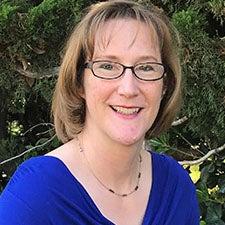
Heather Stringer
Heather Stringer is a freelance health and science journalist based in San Jose. She studied civil engineering at Stanford University and started her journalism career at a daily newspaper in Fremont. Heather began covering health care as a staff writer and editor at a nursing magazine and launched her freelancing career in 2003. Her work has been published in Scientific American, Monitor on Psychology, Cure, Proto, and Nurse.com.
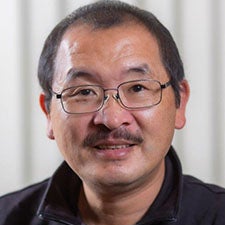
Ringo Chiu
Ringo Chiu is a Los Angeles–based photojournalist whose work has been published in newspapers across the globe. He won a 2021 Pulitzer Prize in breaking news photography and was a 2019 Pulitzer finalist in that category. Chiu was born in China and raised in Hong Kong before coming to the US.
Chiu works as a freelance photographer for the Associated Press, Los Angeles Times, Agence France-Presse, Reuters, European Pressphoto Agency, Getty Images, Xinhua, and Zuma Press. He also works as a chief editorial photographer for the Los Angeles Business Journal.

